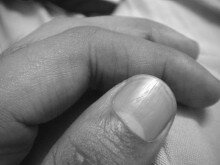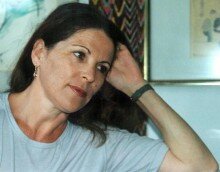Where does Mordechai Geldman’s poetry come from? A psychologist-poet analyzes the sources of his work

When I was four or five years old, my parents put me in a wooden playpen and left the house for a little while. I was alone. It was during Chanukah, and somehow I was able to reach for the box of candles in the room. Using a few candles, I “wrote” my name on the sheet. Wishing my parents to see what I had done, I curled up in the corner of the playpen and waited. As to the color of the candles I picked, my memory is divided: in one version they’re red and blue, in another, yellow.
It is possible that this “installation” is the very first poem I’ve written, a poem of two words, made with cylinders of colored wax. I recalled this event ten years or so ago, and understood that this exploit was a sort of preamble to my work as a poet.
In this “poem” we see several mental elements that developed over time: love for light; an affinity for the sacred; a penchant for the miraculous and the wondrous; a keen dialectic stance toward Jewish identity (the Chanukah story, after all, also includes the Greeks); conflicting proclivities: self-contained or outgoing; and self-reliant when a loved one departs.
But the first real poem I ever wrote was in a notebook when I was fourteen years old and sitting on the edge of a white bathtub. During my tenth or eleventh year, at a golden noon-hour of the Sabbath, my mother sat on the edge of the tub and cut her wrist with a razor blade. When I walked in on her, she quickly hid her hand behind her back, and drops of blood trickled onto the tub. I took a fright as one pulled by a big wave into the depths of the sea. I may have screamed, I may have yelled at her. She allowed me to bandage her wrist, and then she went to bed. When evening came, she received our guests pleasantly and lucidly. She was particularly beautiful that evening, and a soft pale light radiated from her face.
In my child’s consciousness she tried to kill herself. And yet it is clear she did not intend to end her life that Saturday noon, for we were all in the house, and it was highly unlikely that we would not catch her in the act. The suicide spectacle was a call for help, and, possibly, an attempt to tighten her hold on the family. Whatever the case, the immediate impact was very traumatic to my young soul, and from thereon, for many years, I lived with the anxiety that she would kill herself. The razor blade, a kind no longer manufactured, became for me a thin and tiny steel door to an apocalyptic world. When my parents’ quarrels rose and escalated, I’d hide the blades in secret places, and maybe that’s why, when she tried again, she chose sleeping pills. The pills, too, she swallowed when we were all in the house—my father, my sister, and I—as night had already fallen on Tel Aviv.
I crossed the night air, running to the house of Dr. Goldberg, with the urgency of one whose mother’s life depended on him. Winds shrieked in my ears, even though no wind was blowing. The doctor lived in our neighborhood, and I summoned him around midnight. He arrived without delay, flushed out her stomach, and didn’t send her to the hospital.
I recall my mother’s suicide attempts vividly, but the memory of myself sitting on the edge of the white enamel tub and writing my first poem rouses my suspicion. Is this how it actually happened, or did my imagination make up this “memory”? Still, such a creation of the imagination, demanding for itself the status of an actual memory, surely carries a strong emotional significance.
I believe that this recollection has chosen the edge of the tub as a border between life and death, signaling the writing as an act of suicide and reviving at once. The trope of my mother’s suicides is interpreted in this recollection as a sick and desperate attempt to speak her silence, to reveal in a scream all the pain that has accumulated in her. When a speaking self speaking its selfhood is missing, or when an adequate listener to the soul is missing, life is not worth living. Writing the poem on the edge of the tub was an attempt to make the subject speak from the depths of its subjectivity.
Correspondingly, as time passes, I understand that in choosing poetry, in choosing the identity of a poet, there was also a suicidal element. Sailing in the rough sea of life to wherever the wind may take me, the pen of the poet my only navigation tool, is, in my view, an “extreme” adventure, very much like the daredevil stunts of bikers, or the challenge of white water rafting, that often entail a suicidal element.
It is also possible to view the poet’s adventure—a poet who began his poetic “career” because of the circumstance of his mother’s potential suicide—as a descent to hell, very much like that of Orpheus, the archetypical poet. From this aspect, the razor blade and the edge of the tub were the gates of hell the poet sought in order to re-find his mother who was lost in her suicide attempt, lost to herself and to her son, even if she did not die. I hope the reader will not judge me pretentious when I compare my case to that of Orpheus, but will read instead my willingness to humbly recognize the influence archetypal patterns exert on all of us.
[...]
It is possible that by sitting on the white enamel and writing a poem, I told my mother: I can live without you, because I’ll give birth to myself again by writing. And also: I will save myself from your fate because I’ll do what you couldn’t do: give expression to myself, write myself. And also: If you thought that I would live by your soul alone—here I am creating my own soul against your being that threatens to silence it. And also: You love poetry, poems always revived you, so here, let me write a poem for you, and please don’t leave me, don’t part from me, don’t spill your blood. And also: Like you, I’ll commit suicide too, and, like you, I’ll live again. When evening comes, I’ll be reborn and will receive my guests with a solemn, radiant calm, and will sing them a little song.
[...]
From the beginning, from early childhood, I had a strong inclination to be overcome by beauty. In my estimation, this predisposition led me more than anything else to pursue poetry and art. In my childhood, the beauty of nature, people, garments, paintings and sculptures, music—all generated exhilaration and enchantment. The beautiful cast onto me a strange magic and roused in me an inexplicable erotic fever. But the beautiful was also in words, perhaps even primarily in words. As a child who received a religious education, my head was filled with the hum of beautiful and holy psalms and verses from the Bible, the prayer book, medieval poetry, and with graceful lines from Bialik’s poetry for children. I, too, wished to create such beautiful verse. With time, my poetry favored the “truthful” and the “good,” and gradually rejected that which employed aestheticism only, charm for the sake of charming. But the ideal of a verse that holds a mysterious power to imprint itself in your brain forever—this still speaks to my heart.
Candle image © cosma on Shutterstock










